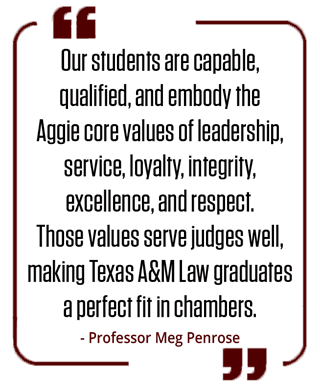Charleson, Curry, Hutchinson and Suarez latest to earn honor
Texas A&M University School of Law's commitment to judicial clerkships is paying off. Another four students recently secured judicial clerkships. Each year, more and more Aggie Law grads are helping to staff judicial chambers. That is a good thing for the bench and an even better thing for the students themselves.
Upon graduation, Texas A&M School of Law third-year students Lynda Charleson, Jordan Curry, Isabelle Hutchinson and Luis Suarez will serve as judicial law clerks for federal and state court judges.
Emerging from a competition with hundreds of applicants, each of the students credited the education and career preparation at Texas A&M School of Law for his or her selection.
 “The law school here invests a ton of resources in clerkships for students,” said Luis Suarez. Fellow student Lynda Charleson added that the Texas A&M Law School support system for its clerk candidates is “reassuring – so helpful.”
“The law school here invests a ton of resources in clerkships for students,” said Luis Suarez. Fellow student Lynda Charleson added that the Texas A&M Law School support system for its clerk candidates is “reassuring – so helpful.”
“Our law school is in the process of building professional pipelines to advance our core strategy of opening new doors for our graduates,” said Texas A&M University School of Law Dean and Anthony G. Buzbee Endowed Dean’s Chair, Robert Ahdieh. “Clerking is an essential waypoint for several legal paths, but it is an extremely valuable experience for any. There may not be any setting in which the mentoring of a young attorney is as robust as the clerkship environment,” Dean Ahdieh said.
Law clerks serve as a close legal assistant for judges, performing a wide array of legal duties. Judges look to their clerks to be extremely well-qualified, with an exceptional ability to conduct legal research and help craft opinions.
In serving as good law clerks, graduates of Texas A&M School of Law bring “much to the table,” said Professor Meg Penrose. “They are good people who have become great thinkers,” she said.
In Texas A&M School of Law’s effort to enhance clerkship opportunities, Dean Ahdieh pointed to a “supply and demand” framework. On the “supply” side, the school works to ensure “students appreciate the value of clerking,” while on the “demand” side, “we work to make judges aware of the qualifications and character of our students,” Ahdieh said.
The clerkship program at Texas A&M Law
The school provides a well-integrated program that promotes clerkships, educates and supports students interested in this opportunity and then promotes those students to judges seeking well-qualified clerks.
An important facet of the program is the law school’s “Clerkship Bootcamp,” a six-week, two-credit advanced writing course for potential judicial law clerks, taught by Professor Penrose.
Jordan Curry praised the bootcamp course and its instructor. “Professor Penrose, a former law clerk and now attorney/professor, teaches students interested in clerkships how to write from the court’s perspective and how to do so with clarity, brevity and grace,” Curry stated. Charleson echoed as much, saying “Professor Penrose’s positivity keeps you going – she is always pumping you up!”
Isabelle Hutchinson added that the bootcamp was “a great foundation,” with faculty and alumni providing “a network for support.” She, like the other students, thanked Professor Penrose for her constant support and guidance. “Without her, I do not think I would have secured a clerkship,” she said.
Hutchinson shared that her experience in the bootcamp “helped me exponentially, as I was able to draft my first Motion to Dismiss in class with Professor Penrose, instead of for the judge.”
Faculty leadership
Professor Penrose points to the excellence of the faculty and staff at the Texas A&M School of Law as essential not only for clerkships, but for the overall success of the school’s law students.
“You can go up and down the halls of this school and visit with experts who bring to the table a wide diversity of experience, a wealth of knowledge and a broad perspective,” Penrose said. “That instills a good deal of confidence in our students going forward,” she added.
Professor Penrose, an American Bar Foundation Fellow, is one of 11 Texas A&M School of Law faculty members who are members of the American Law Institute (ALI). Like many of Texas A&M Law’s esteemed faculty, both Dean Ahdieh and Professor Penrose clerked at the beginning of their distinguished careers.
Support from the Office of Career Services
Supplying key support, expertise and guidance to students in the whole clerkship process is a role of the Texas A&M University School of Law Office of Career Services. Suarez identified the Office of Career Services as vital to his selection.
“Career Services has key resources and provided essential advice and assistance as I navigated the entire process,” Suarez said.
According to Arturo Errisuriz, Assistant Dean of the Office of Career Services, the office provides support in terms of has “both the process and the documents necessary for clerkship applications.” The Office of Career Services not only reviews résumés and cover letters, but also preps each clerk candidate prior to any interview, he said.
Curry praised Assistant Dean Errisuriz in particular for helping with various steps on the way to the eventual clerkship, even before the clerkship application process.
“Dean Artie in Career Services was instrumental in my applying for and accepting my internship with the district court as a 2L. That internship truly shaped the path to my clerkship,” she said.
Charleson also appreciated the school’s ongoing invitations to judges to participate in Texas A&M Law panel discussions. Along with providing an excellent overview of legal issues, “these panel discussions can lead to one-on-one meetings with a judge, and insight into what they are looking for in their clerks,” she said.

Paths to success
In addition to the school’s dedicated programs, there are several other strategies students interested in clerking should embrace, Errisuriz said.
“Interested students need to perform well academically, and pursue opportunities to engage in research and writing. Among other possibilities, it can be helpful to write for a law journal or serve as a research assistant,” he said.
Hutchinson’s experience at Texas A&M Law is a textbook case for setting oneself up as a strong judicial clerkship candidate. She was a faculty research assistant, “made sure that I got on a journal,” and then earned a place on the journal executive board. To gain drafting experience, she served as a student attorney in the Immigrant Rights Clinic and as a law clerk at a commercial litigation firm. Ultimately, she interned for the judge for whom she will clerk upon graduation.
The four students selected for clerkships so far this year are each on the board of a law journal. Suarez is an editor for the Texas A&M Journal of Property Law. Curry and Charleson are both editors for the Texas A&M Law Review, where Hutchinson is the managing editor.
Charleson advised her fellow students seeking a clerkship: “Be persistent – package yourself. Get experience with moot court and journals. Network, and seek support,” she said.
Assistant Dean Errisuriz also recommends that clerkship candidates include some aspect of their personal history in their applications, to help them stand out from the crowd. “Prior experience, including military service, can be very helpful,” he said. More broadly, he suggested spotlighting activities and skills that are interesting and distinctive in one’s application.
Charleson credited her background as a Division-I soccer player as an attribute that helped capture attention. Suarez had interned in the summer with the U.S. Army, assisting the staff judge advocate with pre-trial and trial matters regarding major violations of the Uniform Code of Military Justice. This led to his tentative acceptance to the U.S. Army’s commissioning program as a Judge Advocate General (JAG) officer. His experience and his commitment to the Army was a plus to his judge, he said. The Army will defer his call up to JAG training duty until after the clerkship is completed, he added.
Suarez also commented that “students seeking clerkships should start early – I was almost too late with my application,” he said.

The Aggie Law difference
Finally, Professor Penrose emphasized the quality of the Texas A&M law experience for those seeking to be law clerks – and for those judges looking for clerks.
“Our students are capable, qualified, and embody the Aggie core values of leadership, service, loyalty, integrity, excellence and respect,” she said. "Those values serve judges well, making Texas A&M Law graduates a perfect fit in chambers."
Each student has a unique reason for coming to the law program at Texas A&M, but all of the newly-appointed clerks attributed their attraction to Aggie Law, as well as their own success, to something special about the school.
“This was one of the law schools I visited. It was love at first sight,” Suarez said.
Curry added: “I am in love with the Aggie spirit. I’m excited to take that spirit as I leave the home I have built here, and carry it into my public service as a clerk.”
Students interested in being clerks should stop by or make an appointment with the Office of Career Services to receive up-to-date information on timelines and deadlines for the clerkship application process, as well as advice on the various steps to take. Career Services is located in Suite 220 and can be contacted at careerservices@law.tamu.edu or 817-212-4050.